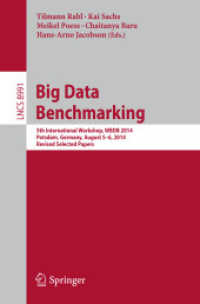- ホーム
- > 洋書
- > 英文書
- > Politics / International Relations
基本説明
Rosanvallon analyses the mechanisms used to register a citizen’s expression of confidence or distrust, and then focuses on the role that distrust plays in democracy from both a historical and theoretical perspective.
Full Description
Democracy is established as a generally uncontested ideal, while regimes inspired by this form of government fall under constant criticism. Hence, the steady erosion of confidence in representatives that has become one of the major political issues of our time. Amidst these challenges, the paradox remains that while citizens are less likely to make the trip to the ballot box, the world is far from entering a phase of general political apathy. Demonstrations and activism abound in the streets, in cities across the globe and on the internet. Pierre Rosanvallon analyses the mechanisms used to register a citizen's expression of confidence or distrust, and then focuses on the role that distrust plays in democracy from both a historical and theoretical perspective. This radical shift in perspective uncovers a series of practices - surveillance, prevention, and judgement - through which society corrects and exerts pressure.
Contents
Preface; Introduction; Part I. Overseeing Democracy: 1. Vigilance, denunciation, evaluation; 2. The overseers; 3. The thread of history; 4. Legitimacy conflicts; Part II. The Sovereignty of Prevention: 5. From the right of resistance to complex sovereignty; 6. Self-critical democracies; 7. Negative politics; Part III. The People as Judge: 8. Historical references; 9. Almost legislators; 10. The preference for judgement; Part IV. Unpolitical Democracy: 11. The sense of powerlessness and symbols of depoliticization; 12. The populist temptation; 13. Lessons of unpolitical economy; 14. Conclusion: the modern mixed regime.





